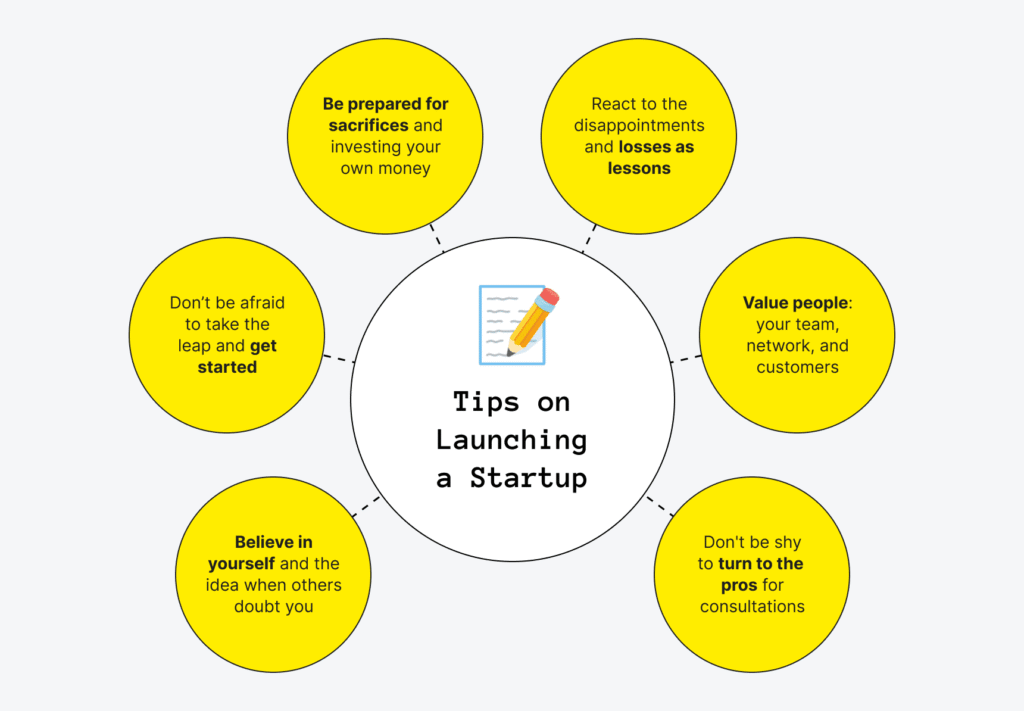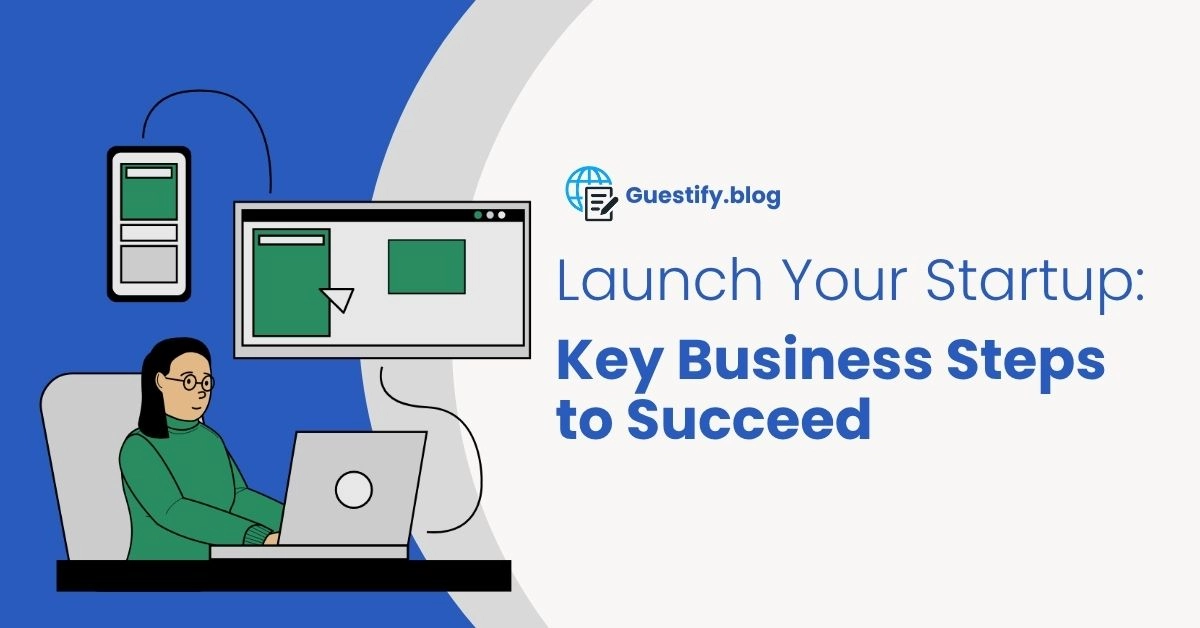Whether you want to turn your passion into a job or solve a problem you’ve noticed, starting a startup and business needs more than just a good idea. You need to plan well, have a clear strategy, be strong, and be ready to adjust when needed.
The world of startups has changed a lot in the last 10 years.
Now, there are many tools and global markets that can help you. But at the same time, there is also more competition and higher expectations from customers and investors.
This guide will help you step by step so that your business starts with a strong base.
Let’s learn what is needed to start and grow a successful business.
The Ultimate Guide to Launching Your Startup:

Conducting Market Research
Before you spend your time or money, make sure people actually need your idea. You can use surveys, talk to people, or study your competitors to check if your product or service is solving a real problem.
Identifying Your Target Audience
It’s very important to know who will buy your product. Make profiles of your ideal customers based on their age, habits, and needs. When you understand your customer, you can make better products and plan your marketing in a smarter way.
Evaluating Market Gaps and Needs
See what your competitors are not offering. Is there a problem they are not solving? Can your startup give something better, cheaper, or faster? Use this knowledge to make your own special place in the market.
Building a Solid Business Plan
A good business plan is like a map for your startup’s success. It makes your goals clear and can help you get money or support from others.
Defining Vision, Mission, and Goals
Clearly explain why your startup exists, what you want to achieve in the future, and what your short-term goals are. These things help set your direction and keep your team focused.
Crafting Financial Projections
Guess how much money you will need to start, run your business, and how much you expect to earn. These numbers help you see your growth and give confidence to investors.
Planning Marketing and Sales Strategies
Write down how you will get customers and turn them into buyers. Will you use SEO, content marketing, social media, or work with other businesses? Also, plan your sales steps and methods.
Choosing the Right Business Structure
Sole Proprietorship vs. LLC vs. Corporation

Every business type has different rules for taxes, risk, and raising money. For many startups, an LLC is a good choice because it’s simple and gives some protection. Talk to a lawyer or expert for the best advice.
Legal Requirements and Licenses

Register your business name, get a tax number, and apply for any needed local or state licenses. Following legal rules now can save you from big problems later.
Securing Funding for Your Startup

Bootstrapping and Self-Funding
Many business owners start with their own savings. This gives you full control, but it can be risky if your idea needs a lot of money in the beginning.
Pitching to Investors and Venture Capitalists
Make a strong and clear pitch presentation. Practice how you will talk about your business. Show the market potential, how your business will make money, and any progress you’ve made. Be ready for difficult questions.
Crowdfunding and Grant Opportunities
Websites like Kickstarter or Indiegogo help you raise money and test your idea. You can also search for small business grants or programs that support new startups.
Assembling Your Dream Team
Hiring Co-Founders and Key Staff

Pick co-founders who have skills that you don’t have. In the beginning, hire people who can do many things and truly believe in your mission.
Creating a Collaborative Culture
A friendly and open work culture helps people work better and stay longer. Support new ideas, honest communication, and teamwork.
Setting Up Business Operations
Choosing Business Tools and Tech Stack

Use the right tools like accounting software or project management apps to make your work easier. Choose tools that can grow with your business and work well together.
Establishing Workflows and Processes
Clearly define who does what and how things should be done. Good systems help avoid mistakes and save time for growing the business.
Launching and Marketing Your Startup

Branding and Positioning Strategies
Create a memorable name, logo, and voice that reflect your startup’s identity. Make sure your value proposition is clear and compelling.
Digital Marketing and Social Media Launch
Leverage SEO, paid ads, email campaigns, and influencer marketing to spread the word. Social proof (testimonials, reviews) builds trust quickly.
Scaling and Growth Strategies
Analyzing Performance Metrics
Use tools like Google Analytics and CRM dashboards to check how your business is doing. This helps you see what’s working well and where you need to make changes.
Improving Product-Market Fit
Keep talking to your customers. Their feedback helps you make your product better and match what people need as things change.
Common Mistakes to Avoid in a Startup
-
- Skipping Validation: Don’t just guess people want your product make sure by testing it first.
-
- Scaling Too Soon: Grow your business slowly and wisely. Growing too fast in the beginning can cause failure.
-
- Ignoring Cash Flow: Always keep track of your money. Having enough cash is very important.
-
- Neglecting the Team: Even the best product needs a strong team behind it to succeed.
-
- Avoiding Feedback: Listen to feedback, even if it’s negative. It helps you get better.
Conclusion:
Starting a startup and business is not just about being brave—it’s about following a clear plan. From testing your idea to growing your business, every step helps you build a strong future. Stay open to learning, be ready to change, and work with the right people. The journey won’t be easy, but with hard work and planning, it can be very successful.
Want to share your startup journey or boost your brand visibility? Publish a paid guest post on Guestify.blog today and reach a global audience.
FAQs
Q1: How do I know if my startup idea is good?
Start by conducting market research and talking to potential users. A good idea solves a real problem and has market demand.
Q2: Do I need a business plan to launch a startup?
Yes. A business plan helps clarify your strategy, forecast finances, and attract investors or partners.
Q3: What’s the best way to fund a startup?
It depends on your goals. Bootstrapping works for lean startups, while VC or crowdfunding is better for high-growth ideas.
Q4: How long does it take to launch a startup?
It varies. Some launch in months, others take a year or more. Focus on building a solid foundation over speed.
Q5: When should I hire my first employee?
Hire when tasks exceed your capacity or require skills you lack. Don’t hire too early or too late.


